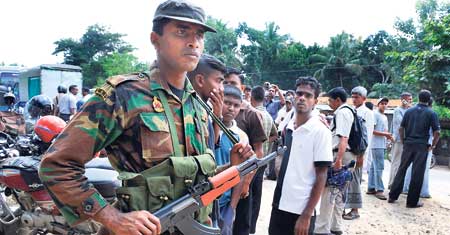
Tough times ahead for Sri Lankans
Sri Lanka faces a decisive stage with the abrogation of the 2002 ceasefire agreement and the potential effects to the economy through international pressure. Sri Lanka is not the only country that’s facing internal strife. Pakistan a major trading partner of Sri Lanka is facing many economic setbacks from election related violence in addition to terrorism. Kenya, a major tea producer and a close competitor of Sri Lanka, has seen destruction and large scale murders following a presidential election. Kenya like Sri Lanka depends heavily on tea and tourism as major facilitators of the economy. Today both these industries are under threat with heavy damages caused to tea plantations and a lucrative tourism industry that was accounting for nearly one million tourists per annum. An industry that has withstood many setbacks and faced these courageously is tourism. Since 1983 tourism has been a casualty in the hands of terrorism of the north as well as the south. The Tourist Board seems energized and rejuvenated and moving courageously amidst a war climate. This is also a good example of competent leadership. Terrorism is now a global menace and the world cannot stop moving giving way to it. It is reported that Sri Lanka registered record arrivals in November and December. Today in a closely linked global village conferences, sporting events, healthcare, etc provide ample opportunities for tourism. Though the earnings from tourism have not been able to show significant improvement this industry is well linked to the society and provide employment and business opportunities to a larger segment of the population. Given the curiosity to find the economic pulse on the street I came across an enterprising, not-so-young man who operates a fruit stall at the “Jathika Pola” at Elvitigala Mawatha. This man says that he was motivated to cultivation by late Prime Minister Dudley Senanayake who gave them land at Rajangana which he cultivates even to date. He proudly recalls how he brought the produce from his cultivation and sold at the “Jathika Pola” then located at the racecourse. His knowledge on world affairs was amazing and sadly narrated that had we maintained this momentum the cost of food would not have been that higher. He was also appreciative of the efforts taken by the late Prime Minister Sirmavo Bandaranaike who also gave prominence for local food production. Speaking of the business climate he said that sales are down by almost 50% and most of the employed people have little money in their hands after meeting the basic utilities. This veteran campaigner of many seasons was highly critical of politically motivated work stoppages and picketing campaigns without doing their share of duty. He further quipped these same people will sweat out under much more difficult conditions in the Arabian desert, Korea etc. Elaborating the farm gate theory he emphasis the need to increase land income and promote the concept of agribusiness. CIC has made giant strides in agri-business and invested heavily in paddy cultivation, rice milling and through continuous research has been able to produce high yielding varieties thus making a significant contribution to lowering the cost of food. It has also gone into large scale banana cultivation in a joint venture with a US corporation. This is a laudable approach by the private sector. The CIC chairman has also warned that global food prices will continue to rise amidst increasing consumption and the farmer’s tendency to move in to bio-fuel for better returns. As this veteran business leader asserts this country is full of resources in land, water resources etc and the “agri-business” concept should be aggressively promoted to make farming an honourable profession. The Emirates announcement of the exit from the equity of Sri Lankan National carrier poses many economic issues. Air transportation is a highly commercialized global business that cannot be done simply by owning an aircraft. For a small country a lot could be achieved by teaming up with an international carrier. A national carrier is also a promoter of tourism and facilitator of skills migration. While other suitable partners may not be hard to find it has to be admitted that during the period of Emirates management it was run like a business venture and was not a burden on people as it earned profits. At this stage of an economic downturn the government cannot afford to spend public funds to acquire the Emirates share, nor getting into running commercial ventures. Email - suvink@eureka.lk |
|
||||||
|
||||||
| || Front
Page | News
| Editorial
| Columns
| Sports
| Plus
| Financial
Times | International
| Mirror
| TV
Times | Funday Times || |
| |
Reproduction of articles permitted when used without any alterations to contents and the source. |
© Copyright
2008 | Wijeya
Newspapers Ltd.Colombo. Sri Lanka. All Rights Reserved. |
